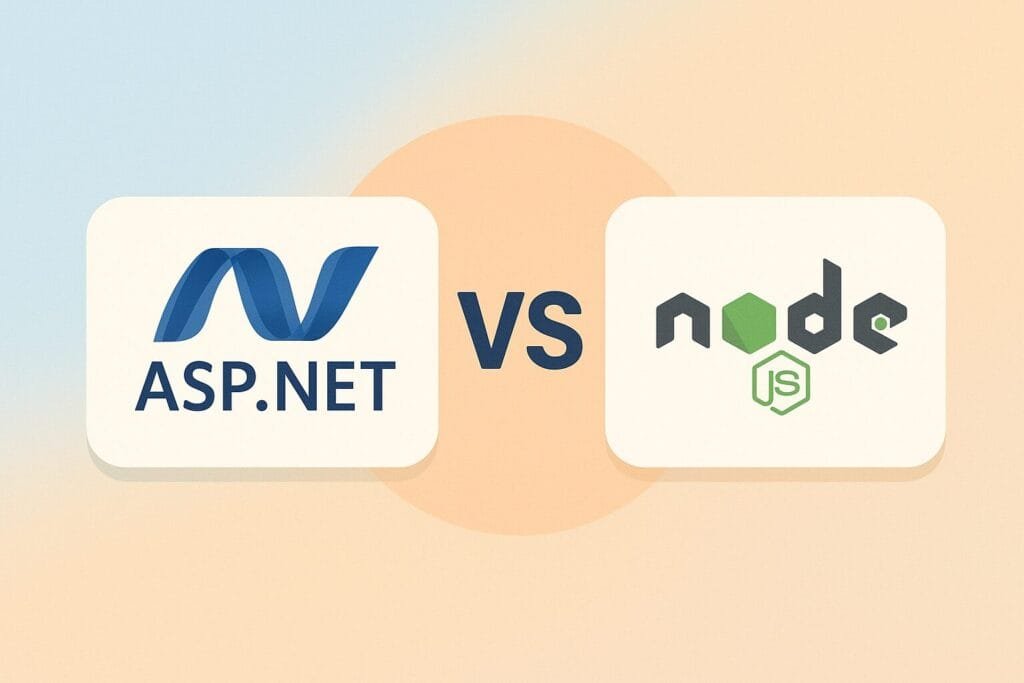When it comes to backend development, two major players stand out — ASP.NET and Node.js. Both are powerful frameworks that have shaped modern web development, but they differ greatly in philosophy, performance, scalability, and ecosystem. Whether you’re a beginner or an experienced developer looking to upskill, understanding the differences between ASP.NET and Node.js will help you make an informed decision about which technology to learn in 2025.

1. What is ASP.NET?
ASP.NET is a web framework developed by Microsoft for building dynamic web applications and APIs. It supports multiple programming languages such as C# and VB.NET, and runs on the powerful .NET platform. ASP.NET Core, its modern version, is open-source, cross-platform, and optimized for high performance. It’s often used for enterprise-grade applications, corporate systems, and large-scale web platforms.
Key Features of ASP.NET:
- Cross-platform support with ASP.NET Core (Windows, macOS, Linux).
- Strongly typed and compiled code using C# for better reliability.
- Excellent integration with Microsoft Azure and cloud solutions.
- Built-in security features such as authentication and authorization.
- High performance using Kestrel server and advanced caching mechanisms.
2. What is Node.js?
Node.js is a runtime environment built on Chrome’s V8 JavaScript engine. It allows developers to use JavaScript for both frontend and backend development, making it a perfect fit for full-stack applications. Node.js is known for its non-blocking, event-driven architecture which makes it highly efficient for I/O-intensive and real-time applications such as chat apps, streaming services, and APIs.
Key Features of Node.js:
- Single programming language (JavaScript) across frontend and backend.
- Massive open-source ecosystem powered by NPM (Node Package Manager).
- Excellent performance for asynchronous and real-time operations.
- Scalable and lightweight architecture for microservices and APIs.
- Active community with continuous improvements and support.
3. ASP.NET vs Node.js: Detailed Comparison
| Aspect | ASP.NET | Node.js |
|---|---|---|
| Language | C#, VB.NET | JavaScript |
| Performance | High performance with compiled code and .NET optimization | Fast with non-blocking I/O, great for real-time apps |
| Scalability | Excellent for enterprise applications | Ideal for microservices and event-driven systems |
| Ease of Learning | Moderate; requires learning C# and .NET concepts | Easy for JavaScript developers to pick up |
| Community Support | Strong Microsoft and enterprise backing | Massive open-source and developer community |
| Hosting & Deployment | Optimized for Azure and IIS | Flexible hosting with any Node-compatible server |
| Security | Strong built-in authentication and identity features | Relies on third-party packages; requires configuration |
4. Performance Comparison
ASP.NET Core and Node.js both offer outstanding performance, but they shine in different areas. ASP.NET performs better in CPU-intensive operations, while Node.js dominates in handling a large number of simultaneous connections. For example, Node.js can easily handle thousands of requests using its asynchronous event loop without blocking the thread. On the other hand, ASP.NET Core leverages the Kestrel web server to deliver impressive throughput for traditional web applications.
5. Scalability and Use Cases
If your goal is to build an enterprise-grade system or an application that integrates with Microsoft services, ASP.NET is the logical choice. However, if you plan to develop real-time applications such as messaging platforms, IoT dashboards, or streaming APIs, Node.js is more suitable. Both frameworks are scalable, but the architectural approach differs. ASP.NET often uses layered architectures, while Node.js embraces microservices for flexibility and speed.
6. Learning Curve
Learning ASP.NET might take more time because it involves mastering C#, the .NET environment, and tools like Visual Studio. However, once mastered, it’s a valuable skill for enterprise and cloud development. Node.js, on the other hand, is easier to learn if you already know JavaScript. Many developers who start in frontend development naturally transition to full-stack by learning Node.js.
7. Community and Job Opportunities
Both ASP.NET and Node.js developers are in high demand. ASP.NET developers often work in enterprise environments and government projects, while Node.js developers are popular in startups and tech companies building scalable APIs. According to Stack Overflow’s Developer Survey, both technologies rank among the most used backend frameworks worldwide.
8. Which Should You Learn?
Your choice depends on your goals:
- If you want to work with Microsoft technologies, enterprise systems, or Azure cloud — learn ASP.NET.
- If you prefer full-stack JavaScript development, lightweight APIs, or startups — learn Node.js.
9. Final Verdict
In 2025, both ASP.NET and Node.js are excellent choices for backend development. The best option depends on your project type, learning preferences, and career goals. ASP.NET offers robust performance, enterprise reliability, and integration with Microsoft’s ecosystem. Node.js provides flexibility, speed, and an extensive open-source community. Either way, mastering one of these technologies will significantly boost your backend development skills.
In conclusion, whether you choose ASP.NET or Node.js, remember that consistent practice and real-world projects are the keys to mastering backend development.

